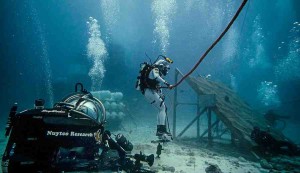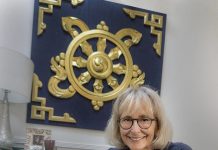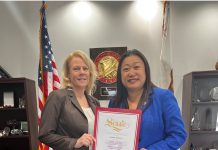
Laguna Beach’s MacGillivray Freeman Films will join an underwater expedition next week led by renowned biologist Dr. Sylvia Earle and a team of aquanauts to the world’s only remaining undersea laboratory, Aquarius Reef Base, located in the Florida Keys National Marine Sanctuary.
The initiative will feature real-time programming to highlight the value of undersea exploration and the challenges facing our oceans. Aquarius is scheduled for closure by the National Oceanic and Atmospheric Association unless new funding is found.
“For 50 years, starting with the first undersea lab built by Jacques Cousteau in 1962, scientists have been living under the sea to better study some of the ocean’s greatest mysteries,” says Shaun MacGillivray, managing director of One World One Ocean, a campaign to raise awareness of the importance of ocean protection. “Aquarius has continued this tradition for more than two decades, and now as ocean research pioneer Dr. Sylvia Earle leads what may be the last expedition to this undersea outpost, we feel a responsibility to share its incredible story with a mass audience.”
Known as “America’s Inner Space Station,” Aquarius has supported 114 missions since 1993 and is the scene of a number of critical scientific discoveries, the MacGillivray statement says. From understanding the disappearance of coral reefs, to providing research on sea sponges, the source of multiple cancer drugs, to training NASA astronauts for space, Aquarius is one of the planet’s most important brain trusts at a time when only 5 percent of the ocean has been explored, according to the statement.
“We know more about the moon than we do about our ocean, which sustains all life on this planet,” said Earle, a One World One Ocean science advisor who led the first all-women team to the Tektite undersea habitat in 1970. “Only by making undersea exploration and research an international priority can we learn what we need to know about the ocean to protect it and protect ourselves.”
The filmmaker will produce original programming from the six-day expedition, giving audiences a behind-the-scenes look at what it’s like to live 60 feet underwater, showcase the lab’s history and scientific achievements, and conduct live interviews with Earle, scientists and special guests.
Audiences will be able to tune in on a special feed on Ustream.tv and dive in to other daily original content at the website oneworldoneocean.org/aquarius.
Located next to a living coral reef 3.5 miles offshore, Aquarius is the only operating undersea laboratory of its kind. It allows scientists to live and work underwater for up to two-week periods using saturation diving, which increases research efficiency and cost effectiveness. Scientists estimate that 10 days of research conducted using saturation diving at Aquarius would take approximately six months to a year if using conventional dives from a boat.
The public can learn more about the newly formed Aquarius Foundation established by Dr. Earle and other scientists to secure new funding to maintain the undersea lab by visiting its Facebook page.




